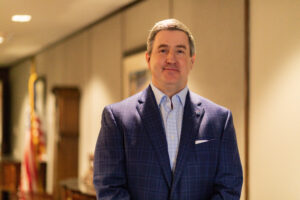Lizzie Hickman & Holly Bonner
Career fairs. Odds are you’ve attended one. Students and professionals walk around booths taking pens and leaving resumes on company-sponsored tables.
They’re full of buzzing talent and opportunities. But what if talent isn’t the only thing you heard buzzing? Suddenly the fluorescent lights are making a sound, the click, click, click of dress shoes consumes you and the number of jostling people overwhelms.
That’s what a career fair might feel like for students on the autism spectrum. The University of Tennessee at Chattanooga’s Mosaic program is reverse engineering the career fair model as part of efforts to support the holistic needs of degree-seeking UTC students with autism spectrum disorders (ASD).
“Our best case scenario is employers come with the intention of conducting onsite interviews and hire one of our students for an internship or a job,” says Kyle Hudson, Mosaic Career Coordinator. “Even if employers just come to meet and support the students, it’s dispelling misconceptions about autism.”
Prior to the pandemic, the format looked similar to traditional career fairs except employers move around the room and visit tables with junior and senior students from various fields of study, including many STEM-related majors. This year, the Virtual Reverse Career Fair still provides an opportunity for recruiters to interact with exceptionally talented ASD students in a format that gives them the booth, and the chance to highlight their experiences, abilities and aspirations.
In 2008, Mosaic formed to address the needs of autistic students looking for guidance. Now it has grown into one of the most comprehensive programs in the country.
Mosaic provides ASD students the opportunity to experience college through a four-year credit-bearing curriculum. The first two years focus on personal development and social navigation, while the last two years focus on professional development. Mosaic’s career fair is the grand finale allowing students to showcase all they have to offer to prospective employers.
Students on the spectrum are intelligent and capable, but due to social and sensory barriers, they're often overlooked in the applicant pool.
“A common misconception about ASD students is that we prefer to work in solitude, therefore not functioning well in a team,” says Mae Hamm, a UTC student participating in the Mosaic program. “I disagree with this. We can work well in a team dynamic, but we need structure. A team that doesn't have a set plan and changes their goals constantly would be stressful to a lot of people. Another misconception is that we can choose when we hyper-focus on a task. It comes in unpredictable moments.”
“Many believe that ASD students are slow workers, and although it does take us time to communicate and navigate social interactions, once we get going we tend to keep going,” says Austin Holt, another participating student. “If we are particularly knowledgeable or experienced in the specific subject or activity at hand we can easily keep up pace.”
College traditionally gives young adults time to grow into their new sense of independence and develop their own values and beliefs. For Mosaic students, part of their college experience is learning to navigate social settings that may seem foreign to them.
The beauty in the Mosaic program is helping students unleash the immense amount of potential they already have so they can excel as professionals. One way Mosaic does this is by establishing peer mentorships between its students and other UTC students. Through these relationships, Mosaic students dive deeper into campus life and grow more socially confident.
“I look forward to making connections through this event,” Hamm says. “Even if it's in fields that I would not pursue, I want to be able to get my name out into the world of employment. I enjoy meeting new people. Knowing that I made enough of an impression for someone to reach out to me is exciting.”
What results from the Mosaic program is a class of career-ready and determined individuals who are prepared for the next step of their lives.
“Our students cover the whole scope of degrees offered at UTC,” Hudson says. “While we do have a slight skew toward engineering and computer science majors, we also have students who are interested in studying sports, education or the performing arts.”
Chattanooga-based companies such as Unum, BlueCross BlueShield, Volkswagen and more have successfully partnered with Mosaic to hire some of their top students. By bringing neurodiversity into the workplace, these companies have opened their doors to a new group of uniquely talented and intelligent employees.
“The best days at my job are when I can help a student overcome barriers in the employment process, and begin a career they never would have had access to without Mosaic's training and community,” Hudson says.
Along with employers, Mosaic also welcomes people who can be resources for volunteer or job shadowing opportunities.
You can register for the Virtual Reverse Career Fair here.
The link to the online platform will be provided the week of the event, and you will have the opportunity to review the students' profiles, promotional videos and resumes prior to the synchronous meetings which will be held on April 13 from 3 to 5 p.m.
If you or your business would like to sponsor the Reverse Career Fair or the Mosaic Program, contact Kyle Hudson at [email protected] for information about opportunities available for partnership and branding.







